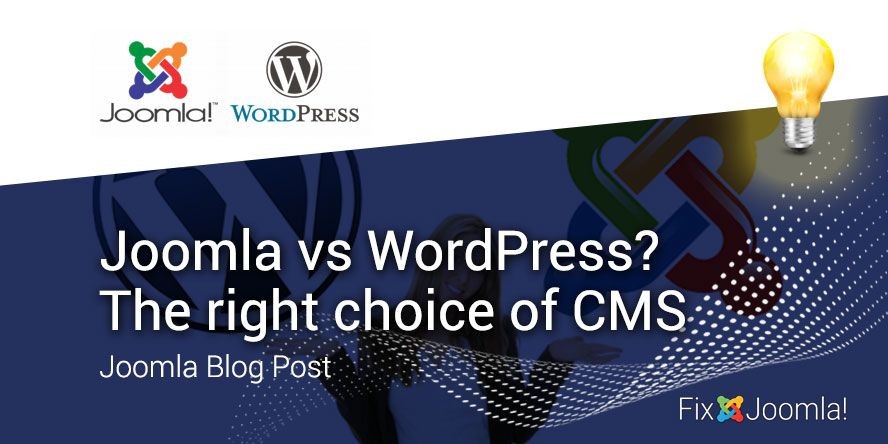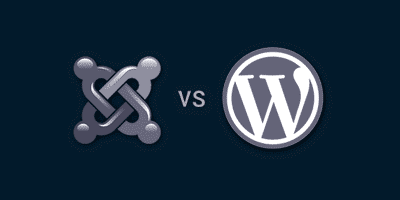Joomla vs WordPress? The right choice of CMS in 2020!
If you plan to launch a new site and want to figure out which CMS to choose in 2020, WordPress or Joomla, read this article where we do our own analysis. Joomla or WordPress - this question is increasingly asked by novice webmasters and even experienced website developers. The competition under the slogan "JOOMLA vs WORDPRESS" continues and it will be especially interesting to watch its progress after the appearance of Joomla 4 on the CMS market.
We are not ready to state unequivocally that one of these content management systems is better or worse. But based on our own experience, our team made its choice in favor of CMS Joomla.
And this is despite the fact that today the market share occupied by CMS Joomla (about 5%) is significantly lower than that of WordPress (about 60%).
When deciding on the choice of a content management system, it is important to examine five key evaluation criteria:
- How well written is the CMS code and how well is the structure of the interaction of its basic and additional elements developed
- How the site will be evaluated by search engines and what are the mechanisms for proper search engine optimization
- How secure is the CMS from hacking attempts and hacker attacks and what extensions will help increase the security of the system
- How convenient and intuitive CMS for administration
- Potential CMS opportunities for website development by installing additional plugins and components and increasing functionality
We will try to give an independent assessment of these criteria for Joomla and WordPress.
1. Source code and structure of CMS Joomla and WordPress
1. Source code and structure of CMS Joomla and WordPress
CMS Joomla is developed in accordance with the concept of MVC, and has a high-quality code. The quality of the code is definitely higher for Joomla than for WordPress. The source code of Joomla is open to all comers, which forces developers to keep the brand and make corrections when comments from the community arise. Joomla code is pretty well documented. If you are good at programming, you can easily create your own extension that will work in CMS.
WordPress, in principle, is written well, but any specialist understands that this is an old-school style. And here we will not delve into the intricacies like global variables or built-in image slicing mechanisms. It's enough to understand that even the most popular plug-ins for WordPress are a mixture of different concepts. To understand the code and make corrections, special knowledge and a lot of time are required. This is clearly seen in numerous forums where developers are trying to find answers to the same questions.
But the most important difference in the concepts of the interaction of scripts and database tables. Any request to render a page of a WordPress site entails a survey of all installed plugins, which significantly increases the required resources and reduces the speed of request processing. Of course, in the basic version, all this happens rapidly. But any modern site requires the installation of dozens, and sometimes hundreds of extensions. As a result, the WordPress site has serious problems with the download speed and, as a result, with search engine optimization.
In CMS Joomla, the process is much simpler and more efficient. When rendering pages, requests go only to those extensions that are used on this particular page. And as a result, the addition of powerful components, for example, for Internet commerce or a social network, has practically no effect on the operation of other pages of the site.
2. Search engine optimization on Joomla or WordPress
WordPress uses the Yoast SEO plugin to solve SEO optimization tasks. This is a convenient extension and easy to manage. But this plugin in the full version is quite expensive. In the basic version of Joomla, all the necessary tools for managing SEO site optimization are already built-in. If for some reason they are not enough, there are paid solutions (RSSEO, JoomSEO, sh404SEF and a few others) that are not inferior in functionality, and sometimes surpass Yoast SEO. At the same time they are cheaper.
With proper SEO settings for Joomla or WordPress, there are no special differences in the quality of search engine results. In principle, with proper work with SEO for WordPress and Joomla, both systems get the same chance of success from search engines. This is especially noticeable recently.
Issues related to SEO optimization are now actively intervened by search engines evaluating the speed of page loading. And here, as indicated in the previous paragraph, Joomla looks better.
As a confirmation, we suggest that you independently compare the download speed indicators using the Google PageSpeed Insights tool for TOP WordPress sites and, for example, our site FIXJOOMLA.COM.
Follow the links and you will see the results of the speed assessment for desktop computers. There you can see the results for mobile devices, which may seem even more convincing.
- Google PageSpeed Insights >> TechCrunch Magazine Site >>
- Google PageSpeed Insights >> New Yorker Newspaper Website >>
- Google PageSpeed Insights >> FIXJOOMLA.COM website >>
It's hard to suspect the developers of such popular sites as TechCrunch or New Yorker of lack of professionalism in matters of optimizing WordPress download speed, however, the results speak for themselves. Surely they tried to squeeze out the maximum possible, but the system itself did not allow them to bring these sites to the "green zone" of Google PageSpeed Insights due to the huge number of plugins and the ineffective interaction scheme of these plugins when creating the page.
From our point of view, there can be no better evidence in favor of CMS Joomla!
3. Content Management System Security
You could often hear security complaints about Joomla CMS. But all this refers to the far forgotten past. Indeed, there were serious Joomla security issues in the early stages of development. Now the situation has changed radically. The latest versions of Joomla are well protected and it is already quite difficult to find negative ratings. Unless Joomla security issues have arisen due to webmaster's own mistakes. Such problems arise mainly as a result of installing hacked applications, or because of an irresponsible attitude to password storage or obvious unprofessionalism when configuring the system itself and its extensions.
In practice, we have never encountered hacks on the Joomla sites of our clients if the system itself and third-party extensions were updated in a timely manner. There have been such cases with WordPress, but they can be counted on the fingers. Most likely this is due to the market share of these CMS. WordPress is much more widespread and of course is of interest to a huge number of hackers.
As for additional security features, WordPress has a powerful Wordfence plugin, and it does its job well. For Joomla, there are several solutions among which the best today is RSFirewall.
In general, here we can say that parity is respected and neither WordPress nor Joomla have obvious advantages. The differences are only in the cost and convenience of setting up extensions, which is insignificant.
4. Convenience of CMS and intuitive clarity for the site administrator
The opinion that WordPress is simple and clear, and that any novice webmaster can easily cope with it is heard very often. This is basically the case, but as they say there are nuances. Many settings are really not questionable and implemented great. But sometimes without additional plugins, complex puzzles arise.
For example, with the placement of modules on the site. It would seem that it could be simpler, but in WordPress this process is much more complicated and often resembles a rebus.
In Joomla, everything is simple and clear, but maybe this is only our subjective opinion. Therefore, we will not insist. In this matter, everyone should evaluate for himself. We, relying on our own experience with both WordPress and Joomla, give preference to CMS Joomla in this matter without any reservations.
5. Potential opportunities in terms of expanding the site functionality
In WordPress, WooCommerce remains the main solution for creating an online store and there are practically no alternatives. Someone will say that this is enough, but no. Dozens of different online stores have been developed for Joomla and some of them are significantly superior to WooCommerce even in the basic configuration. The same goes for multilevel communities and social networks. Extensibility is the main advantage of CMS Joomla in comparison with WordPress and the immediate platform of online stores. At Joomla, an online store, this is just one of the extensions. In parallel, you can have a full-fledged Joomla blog, your own social network, forum or message board on your site.
Summing up, we can say that in all of the listed parameters Joomla is not inferior to WordPress, but in some it has advantages. If your plans are to create a simple corporate website or blog, you can use any of these CMS, and you probably will not encounter any difficulties. If you do not yet know what your new project will ultimately become and admit the possibility of serious growth, we recommend using Joomla.
Learn more about the main advantages of Joomla
in the article "15 key Advantages of Joomla CMS"
When you subscribe to the blog, we will send you an e-mail when there are new updates on the site so you wouldn't miss them.



